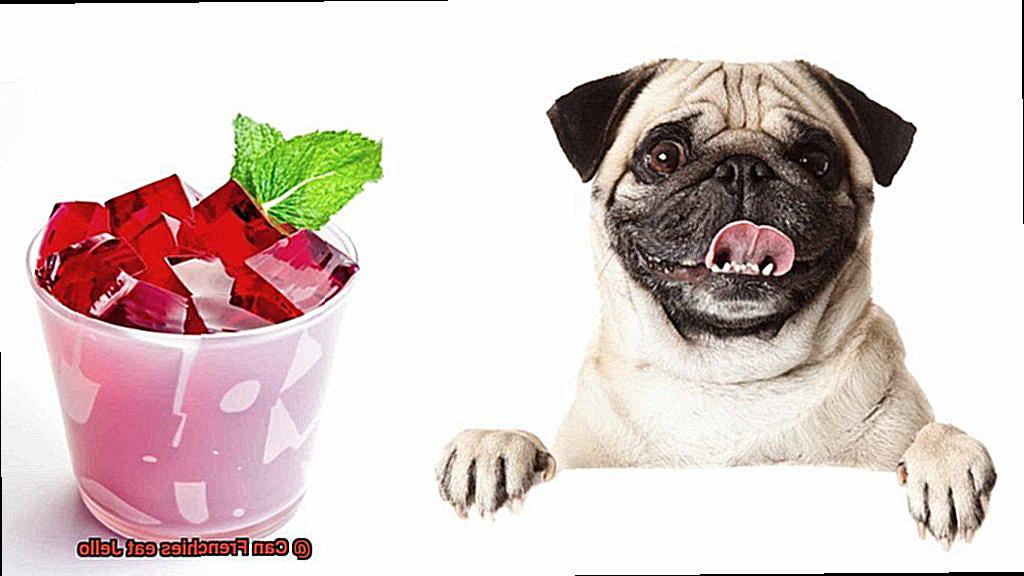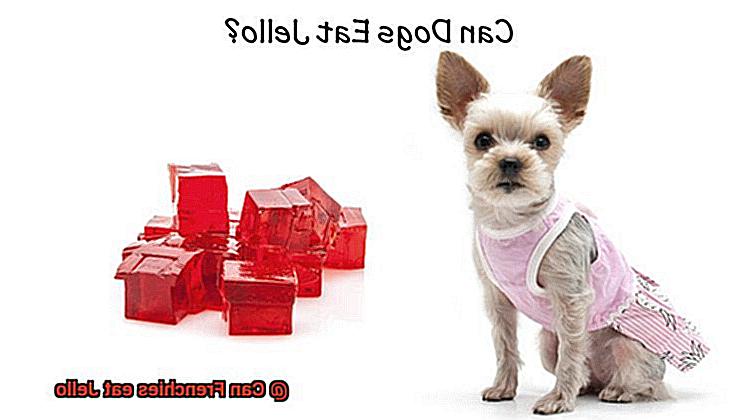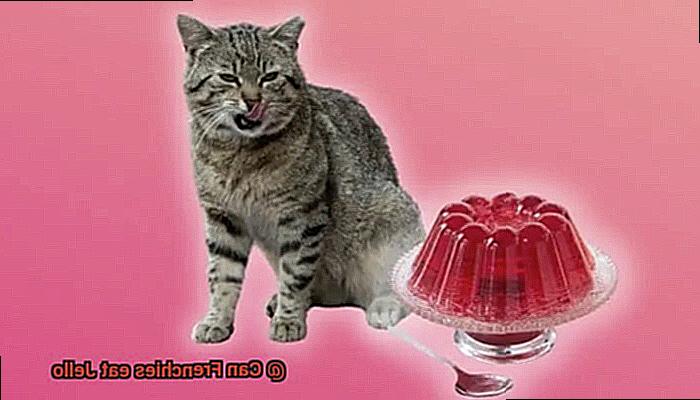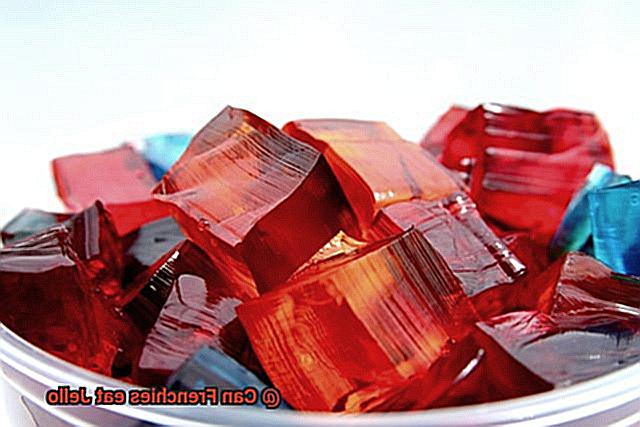Can Frenchies eat Jello?
Today, we’re diving headfirst into a peculiar and tasty topic – can our beloved Frenchies chow down on one of America’s favorite desserts: Jello? You might be scratching your head, wondering if this jiggly treat is suitable for your furry friend’s sensitive stomach. Well, fret not, because we’re about to spill the beans and dish out some fascinating facts about Frenchies and their relationship with Jello.
Who would’ve guessed that our pup pals could join in on the fun of this wibbly-wobbly delight? But before we get into the nitty-gritty details, let’s shed some light on these adorable bat-eared pups known for their hilarious antics and unwavering loyalty.
French Bulldogs, or as we affectionately call them, “Frenchies,” are a small but sturdy breed that originated in the 19th century as descendants of English Bulldogs. With their squished faces and compact bodies, these little companions have stolen hearts all over the world.
Now, let’s tackle the burning question: can Frenchies indulge in the jiggly goodness that is Jello? As responsible pet parents, it’s crucial to ensure we offer our furry friends only safe and suitable treats. So let’s get down to business and explore whether Frenchies can savor this gelatinous wonder without any negative consequences for their health.
Stay tuned for our enlightening journey into the realm of Frenchies and Jello as we unveil all the essential deets you need to know. From potential health perks to possible concerns, consider us your go-to source. Because let’s face it – our fur babies deserve nothing but top-notch treatment.
Get ready to embark on a flavorful adventure with your Frenchie by your side. We’ll separate fact from fiction, unveil the safe and scrumptious possibilities, and ensure your furry buddy can enjoy an occasional Jello treat worry-free. Because a happy and content Frenchie is a sight to behold.
Note: Always consult with your veterinarian before introducing any new food or treat into your Frenchie’s diet. Safety and moderation are key when it comes to spoiling our four-legged pals.
Understanding the Potential Dangers of Feeding Frenchies Jello
Contents
- 1 Understanding the Potential Dangers of Feeding Frenchies Jello
- 2 Benefits of a Balanced Diet for French Bulldogs
- 3 What Ingredients Should Be Avoided in Jello?
- 4 Is Plain Gelatin Safe for French Bulldogs?
- 5 The Risk of Excessive Sugar Consumption for Dogs
- 6 Potential Digestive Issues with Jello
- 7 Consulting with Your Veterinarian Before Offering Jello to Your Frenchie
- 8 Conclusion
French Bulldogs, or Frenchies, are adorable and beloved pets known for their unique appearance and friendly personalities. As responsible Frenchie owners, it is crucial to understand the potential dangers of feeding them certain foods. In this article, we will explore the potential risks associated with feeding Frenchies Jello, a popular gelatin-based dessert.
The Sweet Dilemma:
One of the main concerns when it comes to feeding Frenchies Jello is the high sugar content. French Bulldogs are prone to weight gain and obesity, which can lead to serious health issues like diabetes. Sugary treats like Jello can exacerbate these problems, putting your Frenchie’s health at risk.
Artificial Additives:

Commercial brands of Jello often contain artificial flavors, colors, and preservatives that may not sit well with a Frenchie’s sensitive digestive system. These additives can cause gastrointestinal distress, including diarrhea and upset stomach. It is crucial to prioritize a natural and balanced diet for your Frenchie to avoid unnecessary digestive complications.
Gelatinous Hazards:
The texture of Jello poses another danger for French Bulldogs. Their short snouts and compact mouths make it difficult for them to chew and swallow food that is not easily broken down. The gelatinous consistency of Jello can become lodged in their throat or cause blockages in their digestive tract, leading to choking hazards.
Conclusion:

Feeding Frenchies Jello may seem harmless, but it is important to prioritize their health and well-being. The high sugar content, artificial additives, and gelatinous texture can pose potential risks for these adorable pets. Instead of offering Jello as a treat, focus on providing your Frenchie with a balanced and nutritious diet that meets their specific dietary needs.
Benefits of a Balanced Diet for French Bulldogs
French Bulldogs, or Frenchies as we lovingly call them, are adorable little bundles of joy that bring happiness to our lives. As responsible pet owners, it is our duty to provide them with the best care possible, and that includes feeding them a balanced diet. A well-balanced diet plays a crucial role in keeping our Frenchies healthy and free from common health issues. In this article, we will explore the benefits of a balanced diet for our beloved French Bulldogs.
Maintaining a Healthy Weight:
French Bulldogs are prone to obesity, which can lead to various health problems such as joint issues, heart disease, and diabetes. By providing them with a balanced diet that includes the right amount of nutrients and calories, we can help them maintain a healthy weight and prevent these potential health issues.
Improved Digestion:
Frenchies can be prone to digestive problems like flatulence, diarrhea, and constipation. Feeding them a balanced diet that includes high-quality proteins, fibers, and probiotics can promote healthy digestion and alleviate these issues.

Strengthened Immune System:
A balanced diet plays a crucial role in supporting the immune system of French Bulldogs. By providing them with a variety of nutrient-rich foods, we ensure they receive all the vitamins and minerals necessary to strengthen their immune system and fight off infections and diseases.
Healthy Skin and Coat:
French Bulldogs are known for their sensitive skin, which can easily become dry, itchy, or prone to allergies. Including foods rich in omega-3 fatty acids, such as fish or flaxseed oil, can help improve the condition of their skin and coat.
Enhanced Energy Levels and Mental Clarity:
A well-balanced diet contributes to maintaining optimal energy levels and mental clarity in French Bulldogs. Providing them with a mix of proteins, carbohydrates, and fats ensures they receive the necessary fuel to stay active and alert throughout the day.
What Ingredients Should Be Avoided in Jello?
Let’s dive deeper into the world of Jello and discuss which ingredients should be avoided when feeding this gelatin-based dessert to your French Bulldogs. After all, we want to keep our furry friends happy and healthy, right?

First on the list of ingredients to avoid is artificial sweeteners, especially xylitol. Xylitol is a sugar substitute commonly found in many sugar-free Jello products. However, it’s highly toxic to dogs and can cause a rapid release of insulin, leading to dangerously low blood sugar levels. Even a small amount of xylitol can be life-threatening for our Frenchies, so be sure to check the label for this sweetener before sharing your Jello.
Next up is artificial food coloring. While it may make Jello look more appealing to us humans, it can have adverse effects on our four-legged friends. Some dogs are sensitive to artificial food coloring and may experience gastrointestinal upset, allergic reactions, or even behavioral changes. Opt for natural food dyes or choose Jello products that are free from artificial coloring.
Preservatives like sodium benzoate or potassium sorbate are also ingredients to steer clear of. These additives help extend the shelf life of Jello but have been associated with allergic reactions and other health issues in dogs. It’s best to choose preservative-free options or make your own Jello using fresh and natural ingredients.
Lastly, certain flavors of Jello may contain citrus fruits or berries that can be problematic for Frenchies. Citrus fruits contain high levels of citric acid, which can irritate their sensitive digestive systems and potentially lead to tummy troubles. And while we love berries, they can pose a choking hazard or cause allergic reactions in some dogs. So, avoid Jello flavors that contain these ingredients or consult with your vet before offering them to your Frenchie.
To sum it up, be mindful of the ingredients in commercially available Jello products. Say no to artificial sweeteners, artificial food coloring, preservatives, and potentially problematic fruits or berries. By being a savvy shopper or making homemade Jello with dog-friendly ingredients, you can keep your French Bulldogs safe and satisfied.
Is Plain Gelatin Safe for French Bulldogs?
French Bulldogs are adorable and playful companions that deserve the best care and nutrition. As a responsible pet owner, you may be wondering if plain gelatin is safe for your furry friend. Well, the answer is both yes and no. Let’s dive into the gelatinous world and explore why it’s important to consult with a veterinarian before introducing plain gelatin into a French Bulldog’s diet.
- The Good News: Gelatin can provide some health benefits for French Bulldogs. It is derived from collagen, a protein found in animal tissues. Plain gelatin is a common ingredient in many commercial dog food products and treats because it can promote joint health and improve digestion. So, giving your French Bulldog a small amount of plain gelatin can be beneficial.
- The Bad News: Not all gelatin products are safe for dogs. Some flavored or sweetened gelatins may contain additives or artificial ingredients that can be harmful to our four-legged friends. These additives can cause gastrointestinal upset, allergic reactions, or even toxicity. It’s essential to read the labels carefully and avoid any gelatin products with added ingredients.
- The Importance of Consulting with a Veterinarian: Every dog is unique, and what may be safe for one breed or individual may not be safe for another. Before introducing plain gelatin into your French Bulldog’s diet, it’s crucial to consult with a veterinarian. They will consider your dog’s specific needs, health conditions, and dietary requirements to determine if gelatin is suitable.
Additionally, if your French Bulldog has any known allergies or sensitivities, your veterinarian can help you identify potential allergens in gelatin or other ingredients. They may recommend alternative supplements or treats that provide similar health benefits without risking any adverse reactions.
Remember, your veterinarian is the best resource when it comes to your French Bulldog’s health and nutrition. They can guide you in making informed decisions and help you create a balanced and safe diet for your furry friend.
The Risk of Excessive Sugar Consumption for Dogs
French Bulldogs are known for their adorable wrinkled faces and playful personalities. As a French Bulldog owner, you want to ensure that your furry friend leads a healthy and happy life. One way to do that is by being aware of the risks associated with excessive sugar consumption in dogs. Let’s take a closer look at why too much sugar can be harmful to our beloved Frenchies.
- Weight Gain and Obesity: Just like humans, French Bulldogs can become overweight or obese if they consume too much sugar. Sugary treats, such as Jello, can be a hidden source of calories that quickly add up. Obesity can lead to a range of health issues, including joint problems, heart disease, and diabetes. So, it’s essential to keep an eye on your Frenchie’s calorie intake and opt for healthier treats instead.
- Dental Health Problems: Sugar can wreak havoc on your Frenchie’s teeth. It contributes to the formation of plaque and tartar, leading to dental decay, gum disease, and bad breath. Regular dental care, including brushing your pup’s teeth and providing dental chews approved by your veterinarian, can help prevent these issues.
- Blood Sugar Imbalance: Dogs have different metabolic processes than humans, and their bodies may not be equipped to handle high levels of sugar. Excessive sugar consumption can disrupt their blood sugar levels, potentially leading to complications such as diabetes or pancreatitis. It’s crucial to prioritize a balanced diet specifically formulated for dogs to maintain their health.
- Toxic Artificial Sweeteners: Some artificial sweeteners commonly found in sugar-free Jello, such as xylitol, can be highly toxic to dogs. Xylitol can cause a sudden release of insulin in a dog’s body, leading to dangerously low blood sugar levels and potentially life-threatening conditions. Always check the ingredient list before offering any sweet treats to your Frenchie.
To protect your French Bulldog from the risks of excessive sugar consumption, it’s best to stick to a balanced and appropriate diet formulated for dogs. Opt for natural, low-sugar treats approved by your veterinarian and avoid feeding them Jello or any other sugary desserts. Remember, a little indulgence now and then is okay, but their overall health should be the priority.
If you suspect that your Frenchie has consumed a significant amount of Jello or any other food high in sugar, keep a close eye on them for any signs of discomfort, such as vomiting, diarrhea, or lethargy. If these symptoms persist or worsen, don’t hesitate to seek veterinary attention promptly.
Potential Digestive Issues with Jello
French Bulldogs are beloved companions known for their unique personalities and adorable looks. As responsible pet owners, we want to provide them with the best possible care, including a healthy diet. While jello may seem like a harmless treat, it’s essential to be aware of the potential digestive issues it can cause in our furry friends. In this article, we will explore the potential risks associated with feeding jello to French Bulldogs and provide guidance on how to make informed choices for their well-being.
Understanding French Bulldogs’ Digestive System:
French Bulldogs, like all dogs, have distinct digestive systems that differ from humans. Their shorter digestive tracts and physiological differences make them more susceptible to certain digestive issues. Therefore, it’s crucial to be mindful of their dietary needs.
Gelatin and its Benefits:
Gelatin itself is generally safe for dogs in small amounts and can even offer some benefits. The collagen found in gelatin can support joint health and contribute to a glossy coat. However, it’s important to note that not all jello products are created equal.
Potential Additives and Artificial Sweeteners:
Some jello products may contain additives, artificial flavors, sweeteners, or colorings that can be harmful to dogs. These additives have the potential to cause gastrointestinal upset, leading to symptoms such as vomiting, diarrhea, and stomach discomfort. Additionally, certain jello varieties might include xylitol, a sugar substitute that is toxic to dogs even in small amounts. Xylitol can cause a rapid release of insulin in a dog’s body, leading to low blood sugar levels and potentially liver failure.
Reading Labels and Making Informed Choices:
To ensure the safety of your French Bulldog, carefully read the ingredients list before offering them jello. Avoid any jello products that contain artificial sweeteners or potentially harmful additives. Opt for plain gelatin, free from any additives or sweeteners, if you decide to give your French Bulldog jello as an occasional treat.
Consult Your Veterinarian:
As with any new food introduction, it is always recommended to consult with your veterinarian before giving your French Bulldog jello or any other unfamiliar food. They can provide personalized advice based on your dog’s specific needs and health conditions.
Consulting with Your Veterinarian Before Offering Jello to Your Frenchie
We all love treating our furry friends to tasty snacks, but when it comes to Jello, it’s essential to consult with your veterinarian first. Our adorable Frenchies have unique dietary needs and sensitivities that require special attention. Let’s dive into why seeking professional advice is crucial before offering Jello to your Frenchie.
The Sweetener Dilemma:
One of the main concerns with feeding Jello to your Frenchie is the artificial sweeteners often used in its preparation. Many Jello varieties contain sweeteners like xylitol, which can be toxic to dogs. Xylitol can cause a sudden drop in blood sugar levels, leading to weakness, tremors, seizures, and even liver failure. Scary stuff, right?
Gelatin: Friend or Foe?
Now, let’s talk about gelatin, the star ingredient in Jello. Derived from animal collagen, gelatin is generally safe for dogs. However, some pups may have allergies or sensitivities to certain types of protein. It’s important to keep an eye out for any adverse reactions after your Frenchie consumes Jello.
The Artificial Extras:
Jello often contains artificial flavors, colors, and preservatives that may not be ideal for your Frenchie’s health. These additives have the potential to cause digestive issues or allergic reactions in some dogs. Your veterinarian will be able to determine if these ingredients pose any risks for your furry friend.
Consult Your Vet for Paw-some Advice:
To ensure your Frenchie’s safety and well-being, consulting with your veterinarian is a must. They will assess your dog’s individual health needs and provide guidance on whether Jello is safe and appropriate for them to consume. Your vet may also recommend alternative treats or desserts specifically formulated for dogs that meet their nutritional requirements.
Conclusion
To sum up, while French Bulldogs may share our fondness for all things sweet, it’s essential to exercise caution when considering whether they can indulge in a wiggly treat like Jello. The sugar overload, artificial additives, and gelatinous nature of Jello can present potential hazards for these lovable companions.
Tempting as it may be to offer Frenchies a taste of Jello, their health and happiness should take precedence. The high sugar content within this jiggly dessert can contribute to weight gain and obesity, paving the way for serious conditions such as diabetes. Moreover, the synthetic additives commonly found in store-bought Jello might not sit well with the sensitive digestive systems of these unique pups.
Moreover, the gooey texture of Jello poses additional risks to French Bulldogs. It has the potential to become lodged in their throats or create blockages within their compact digestive tracts, leading to dangerous choking hazards. Due to their short snouts and limited oral capacity, Frenchies struggle with consuming food that isn’t easily broken down.
Instead of tempting fate with a bowl of wobbly wonderment, prioritize your Frenchie’s well-being by providing them with a balanced and nutritious diet tailored to their specific needs. Always consult your veterinarian before introducing any new food or treat into your Frenchie’s routine. They possess the expertise needed to offer personalized advice based on your dog’s individual health requirements, ensuring you create a safe and suitable meal plan.
Remember, safeguarding the welfare of our furry friends must remain paramount.




